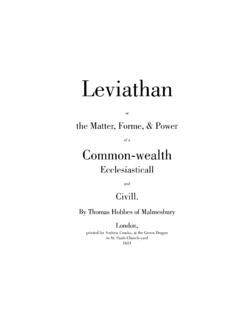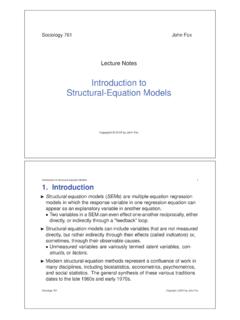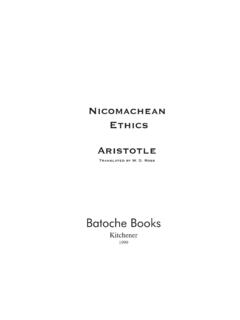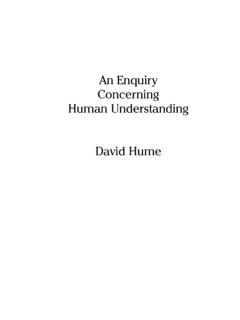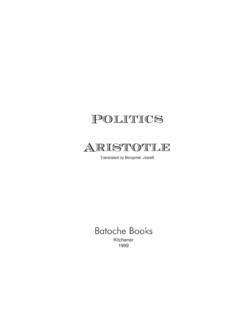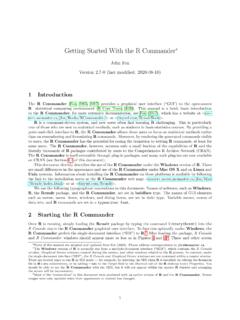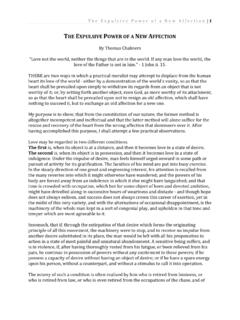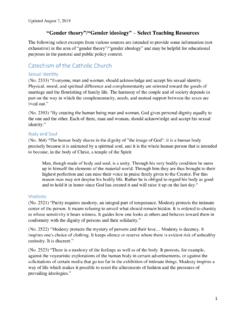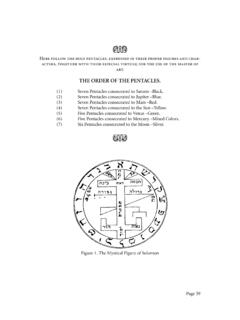Transcription of The Philosophy of History - Faculty of Social Sciences
1 The Philosophy of HistoryGeorg Wilhelm Friedrich HegelWith Prefaces by Charles Hegel and the Translator, J. Sibree, The History of the World is not intelligible apart from aGovernment of the World. W. V. Humboldt Kitchener2001 Batoche Books52 Eby Street SouthKitchener, OntarioN2G 3L1 Canadaemail: of ContentsTranslator s Introduction .. 5 Charles Hegel s Preface .. 11 Introduction.. 14 Geographical Basis of History .. 96 Classification of Historic Data .. 121 Part I: The Oriental World .. 128 Section I: China .. 132 Section II: India .. 156 Section II. (Continued). India Buddhism.
2 185 Section II: Persia.. 191 Chapter I. The Zend People .. 194 Chapter II. The Assyrians, Babylonians, Medes, andPersians.. 200 Chapter III. The Persian Empire and its Constituent 206 Persia .. 207 Syria and the Semitic Western Asia .. 209 Judaea .. 213 Egypt .. 217 Transition to the Greek World .. 240 Part II: The Greek World .. 243 Section I: The Elements of the Greek Spirit.. 245 Section II: Phases of Individuality sthetically 258 Chapter I. The Subjective Work of Art .. 258 Chapter II. The Objective Work of Art .. 261 Chapter III. The Political Work of Art.
3 268 The Wars with the Persians .. 274 Athens .. 277 Sparta .. 280 The Peloponnesian War .. 284 The Macedonian Empire .. 290 Section III: The Fall of the Greek Spirit.. 294 Part III: The Roman World .. 296 Section I: Rome to the Time of the Second Punic War.. 301 Chapter I. The Elements of the Roman Spirit .. 301 Chapter II. The History of Rome to the Second Punic 314 Section II: Rome from the Second Punic War to the 324 Section III: .. 332 Chapter I. Rome Under the Emperors.. 332 Chapter II. Christianity.. 337 Chapter III. The Byzantine Empire.. 353 Part IV: The German World.
4 358 Section I: The Elements of the Christian German 364 Chapter I. The Barbarian Migrations.. 364 Chapter II Mohametanism.. 372 Chapter III. The Empire of Charlemagne.. 377 Section II: The Middle Ages .. 383 Chapter I. The Feudality and the Hierarchy.. 383 Chapter II. The Crusades.. 407 Chapter III. The Transition from Feudalism to 417 Art and Science as Putting a Period to the Middle 427 Section III: The Modern Time.. 430 Chapter I. The Reformation .. 431 Chapter II. Influence of the Reformation on PoliticalDevelopment.. 446 Chapter III. The claircissement and Revolution.
5 458 Notes .. 477 Translator s IntroductionHegel s Lectures on the Philosophy of History are recognizedin Germany as a popular introduction to his system; their form isless rigid than the generality of metaphysical treatises, and theillustrations, which occupy a large proportion of the work, aredrawn from a field of observation more familiar perhaps, thanany other, to those who have not devoted much time tometaphysical studies. One great value of the work is that itpresents the leading facts of History from an altogether novelpoint of view. And when it is considered that the writings ofHegel have exercised a marked influence on the politicalmovements of Germany, it will be admitted that his theory of theuniverse, especially that part which bears directly upon politics,deserves attention even from those who are the most exclusiveadvocates of the practical.
6 A writer who has established his claim to be regarded as anauthority, by the life which he has infused into metaphysicalabstractions, has pronounced the work before us, one of thepleasantest books on the subject he ever read. 1 And compared with that of most German writers, even thestyle may claim to be called vigorous and pointed. If therefore inits English dress the Philosophy of History should be founddeficient in this respect, the fault must not be attributed to has been the aim of the translator to present his author to thepublic in a really English form, even at the cost of acircumlocution which must sometimes do injustice to the meritsof the original.
7 A few words however have necessarily been usedin a rather unusual sense; and one of them is of very frequentoccurrence. The German Geist, in Hegel s nomenclature,includes both intelligence and will, the latter even moreexpressly than the former. It embraces in fact man s entiremental and moral being, and a little reflection will make itobvious that no term in our metaphysical vocabulary could havebeen well substituted for the more theological one, Spirit, as afair equivalent. It is indeed only the impersonal and abstract useof the term that is open to objection; an objection which can bemet by an appeal to the best classical usage; viz.
8 , the renderingof the Hebrew and Greek in the authorized versionof the Scriptures. One indisputable instance may suffice Hegel, The Philosophy of History , 6confirmation: Their horses [ , of the Egyptians] are flesh andnot spirit. (Isaiah xxxi. 3.) It is pertinent to remark here, that thecomparative disuse of this term in English metaphysicalliterature, is one result of that alienation of theology fromphilosophy with which continental writers of the most oppositeschools agree in taxing the speculative genius of Britain analienation which mainly accounts for the gulf separating Englishfrom German speculation, and which will, it is feared.
9 On otheraccounts also be the occasion of communicating a somewhatuninviting aspect to the following distinction which the Germans make between Sittlichkeit and Moralit t, has presented another former denotes conventional morality, the latter that of theheart or conscience. Where no ambiguity was likely to arise, bothterms have been translated morality. In other cases a stricterrendering has been given, modified by the requirements of thecontext. The word moment is, as readers of Germanphilosophy are aware, a veritable crux to the translator.
10 In Mr. Morell s very valuable edition of Johnson s Translation ofTennemann s Manual of the History of Philosophy , thefollowing explanation is given: This term was borrowed frommechanics by Hegel (see his Wissenschaft der Logik, Vol. 3,P. 104, Ed. 1841). He employs it to denote the contending forceswhich are mutually dependent, and whose contradiction forms anequation. Hence his formula, Esse = Nothing. Here Esse andNothing are momentums, giving birth to Werden, , the momentum contributes to the same oneness ofoperation in contradictory forces that we see in mechanics,amidst contrast and diversity, in weight and distance, in the caseof the balance.
